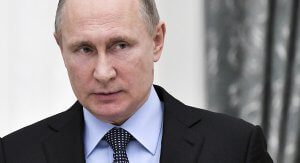 Making the best of a bad situation, Vladimir Putin is determined to make Mr. Putin great again. But his attempt to defy and deny reality and mortality is far from a sure thing, writes Aurel Braun.
Making the best of a bad situation, Vladimir Putin is determined to make Mr. Putin great again. But his attempt to defy and deny reality and mortality is far from a sure thing, writes Aurel Braun.
By Aurel Braun, July 7, 2020
Standing in front of a massive memorial to Soviet soldiers who died in the Second World War, President Vladimir Putin solemnly intoned that it was imperative for people to vote in favour of massive changes to the Russian constitution. The proposal, he asserted there – one day before the conclusion of a seven-day national voting period – was about “the country in which we want to live … and want to pass onto our children.” A tiny man, the 67-year-old Mr. Putin, his face Botox-smooth and taut as he wore an impeccably tailored suit, sought to project the image of a larger-than-life statesman calling on his countrymen to embark on a historic mission to save civilization.
With a “yes” vote totalling 77.9 per cent, it appears he won the resounding victory that he wanted.
His political opponents, however, have a fundamentally different view. They see the plebiscite as all about personal power, a farce, “a huge lie”, “madness” – and the ultimate in political gaslighting.
With more than 200 amendments, Mr. Putin has essentially legislated a new Russian constitution without the normal process required to introduce such cardinal changes. It is the very nature of constitutionalism that the bedrock document – which represents the deep and wide consensus of the population – should be very difficult to change. That such a monumental transformation could be pushed through so brazenly signifies the absence of meaningful legality.
The whole process, moreover, had a tragicomic air to it. Mr. Putin was forced to postpone the vote from April 22 to July 1 because of COVID-19. To encourage turnout, the Kremlin employed immense “persuasion” and offered circus-like incentives: People could win cars, apartments or houses for voting.
There was no effective independent monitoring of the vote. Reports of fraud and ballot-stuffing, however, were overwhelming. In a number of instances, families who turned up in person were told that their votes were already registered.
Witnessing the unashamed confidence and limitless corruption, the BBC reported that copies of the amended constitution were already being sold in Moscow bookstores while voting was still taking place.
Pivotally, the amendments permit Mr. Putin to reset his term-limit clock to zero, allowing him to run for two more terms after 2024. It also gives him the option to hold onto power by using a strengthened Security Council. The President needs those options because his popularity has declined precipitously of late. Russia has the third-highest count of confirmed COVID-19 infections in the world, though the mortality rates are suspiciously low. The energy prices on which Russia so utterly depends have plunged, too. Mr. Putin’s support slumped to 59 per cent in May and June, according to independent pollster Levada.
The amendments also reflect a melding of populism and cynicism in a witches’ brew of contradictory schemes and promises. The traditional values that Mr. Putin claims he wants to reinforce are largely restricted to historic Orthodoxy and government Autocracy. God, as well as the idea of Russian as “the language of the state-forming ethnicity,” are in; same-sex marriage and separatism are specifically forbidden. It should be noteworthy that by banning the “expropriation” of Russian territory, or calls to do so, there is now a constitutional ban on reversing the illegal annexation of Crimea.
Mr. Putin has also added as an amendment the only other measure proven to increase his popularity significantly, besides invasions of foreign territory such as in Georgia or Ukraine: improving pensions. They are now to be index-linked.
Overall though, the thrust here is not only to ensure that Mr. Putin succeeds Mr. Putin, but to also provide an ideological cover for systemic and corrosive corruption, and a historic failure to modernize Russia. Further, it is a sign of Mr. Putin’s weakness that he cannot rely, as his predecessor Boris Yeltsin did, on a dependable successor, leaving him no choice but to try to cling to power indefinitely.
Making the best of a bad situation, he is determined to make Mr. Putin great again. But his attempt to defy and deny reality and mortality is far from a sure thing. What we have seen in the past several months, with the revelations of the massive systemic failure of his rule in regards to COVID-19 and the economic crisis, is that reality is not always a willing participant in Mr. Putin’s magical schemes.
Aurel Braun is a professor of international relations and political science at the University of Toronto and an associate of the Davis Center at Harvard University. He is also an MLI author




